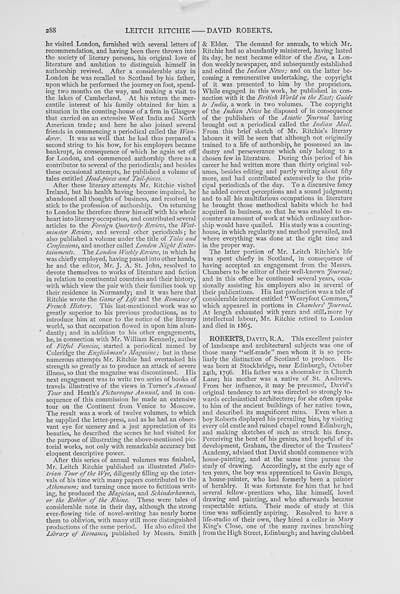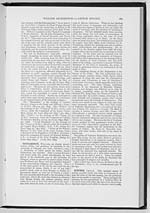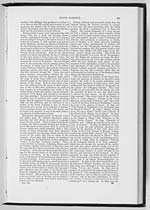288
he visited London, furnished with several letters of
recommendation, and having been there thrown into
the society of literary persons, his original love of
literature and ambition to distinguish himself in
authorship revived. After a considerable stay in
London he was recalled to Scotland by his father,
upon which he performed the journey on foot, spend-
ing two months on the way, and making a visit to
the lakes of Cumberland. At his return the mer-
cantile interest of his family obtained for him a
situation in the counting-house of a firm in Glasgow
that carried on an extensive West India and North
American trade; and here he also joined several
friends in commencing a periodical called the Wan-
derer. It was as well that he had thus prepared a
second string to his bow, for his employers became
bankrupt, in consequence of which he again set off
for London, and commenced authorship there as a
contributor to several of the periodicals; and besides
these occasional attempts, he published a volume of
tales entitled Head-pieces and Tail-pieces.
After these literary attempts Mr. Ritchie visited
Ireland, but his health having become impaired, he
abandoned all thoughts of business, and resolved to
stick to the profession of authorship. On returning
to London he therefore threw himself with his whole
heart into literary occupation, and contributed several
articles to the Foreign Quarterly Review, the West-
minster Review, and several other periodicals; he
also published a volume under the title of Tales and
Confessions, and another called London Night Enter-
tainments. The London Weekly Review, in which he
was chiefly employed, having passed into other hands,
he and the editor, Mr. J. A. St. John, resolved to
devote themselves to works of literature and fiction
in relation to continental countries and their history,
with which view the pair with their families took up
their residence in Normandy; and it was here that
Ritchie wrote the Game of Life and the Romance of
French History. This last-mentioned work was so
greatly superior to his previous productions, as to
introduce him at once to the notice of the literary
world, so that occupation flowed in upon him abun-
dantly; and in addition to his other engagements,
he, in connection with Mr. William Kennedy, author
of Fitful Fancies, started a periodical named by
Coleridge the Englishman's Magazine; but in these
numerous attempts Mr. Ritchie had overtasked his
strength so greatly as to produce an attack of severe
illness, so that the magazine was discontinued. His
next engagement was to write two series of books of
travels illustrative of the views in Turner's Annual
Tour and Heath's Picturesque Annual, and in con-
sequence of this commission he made an extensive
tour on the Continent from Venice to Moscow.
The result was a work of twelve volumes, to which
he supplied the letter-press, and as he had an obser-
vant eye for scenery and a just appreciation of its
beauties, he described the scenes he had visited for
the purpose of illustrating the above-mentioned pic-
torial works, not only with remarkable accuracy but
eloquent descriptive power.
After this series of annual volumes was finished,
Mr. Leitch Ritchie published an illustrated Pedes-
trian Tour of the Wye, diligently filling up the inter-
vals of his time with many papers contributed to the
Athen�um; and turning once more to fictitious writ-
ing, he produced the Magician, and Schinderhannes,
or the Robber of the Rhine. These were tales of
considerable note in their day, although the strong
ever-flowing tide of novel-writing has nearly borne
them to oblivion, with many still more distinguished
productions of the same period. He also edited the
Library of Romance, published by Messrs. Smith
& Elder. The demand for annuals, to which Mr.
Ritchie had so abundantly ministered, having lasted
its day, he next became editor of the Era, a Lon-
don weekly newspaper, and subsequently established
and edited the Indian News; and on the latter be-
coming a remunerative undertaking, the copyright
of it was presented to him by the proprietors.
While engaged in this work, he published in con-
nection with it the British World in the East; Guide
to India, a work in two volumes. The copyright
of the Indian News he disposed of in consequence
of the publishers of the Asiatic Journal having
brought out a periodical called the Indian Mail.
From this brief sketch of Mr. Ritchie's literary
labours it will be seen that although not originally
trained to a life of authorship, he possessed an in-
dustry and perseverance which only belong to a
chosen few in literature. During this period of his
career he had written more than thirty original vol-
umes, besides editing and partly writing about fifty
more, and had contributed extensively to the prin-
cipal periodicals of the day. To a discursive fancy
he added correct perceptions and a sound judgment;
and to all his multifarious occupations in literature
he brought those methodical habits which he had
acquired in business, so that he was enabled to en-
counter an amount of work at which ordinary author-
ship would have quailed. His study was a counting-
house, in which regularity and method prevailed, and
where everything was done at the right time and
in the proper way.
The latter portion of Mr. Leitch Ritchie's life
was spent chiefly in Scotland, in consequence of
having accepted an engagement from the Messrs.
Chambers to be editor of their well-known Journal;
and in this office he continued several years, occa-
sionally assisting his employers also in several of
their publications. His last production was a tale of
considerable interest entitled "Wearyfoot Common,"
which appeared in portions in Chambers' Journal.
At length exhausted with years and still more by
intellectual labour, Mr. Ritchie retired to London
and died in 1865.
ROBERTS, DAVID, R. A. This excellent painter
of landscape and architectural subjects was one of
those many "self-made" men whom it is so pecu-
liarly the distinction of Scotland to produce. He
was born at Stockbridge, near Edinburgh, October
24th, 1796. His father was a shoemaker in Church
Lane; his mother was a native of St. Andrews.
From her influence, it may be presumed, David's
original tendency to art was directed so strongly to-
wards ecclesiastical architecture; for she often spoke
to him of the ancient buildings of her native town,
and described its magnificent ruins. Even when a
boy Roberts displayed his prevailing bias, by visiting
every old castle and ruined chapel round Edinburgh,
and making sketches of such as struck his fancy.
Perceiving the bent of his genius, and hopeful of its
development, Graham, the director of the Trustees'
Academy, advised that David should commence with
house-painting, and at the same time pursue the
study of drawing. Accordingly, at the early age of
ten years, the boy was apprenticed to Gavin Beugo,
a house-painter, who had formerly been a painter
of heraldry. It was fortunate for him that he had
several fellow-prentices who, like himself, loved
drawing and painting, and who afterwards became
respectable artists. Their mode of study at this
time was sufficiently aspiring. Resolved to have a
life-studio of their own, they hired a cellar in Mary
King's Close, one of the many ravines branching
from the High Street, Edinburgh; and having clubbed

![]() Universal Viewer |
Universal Viewer | ![]() Mirador |
Large image | Transcription
Mirador |
Large image | Transcription
![]()

